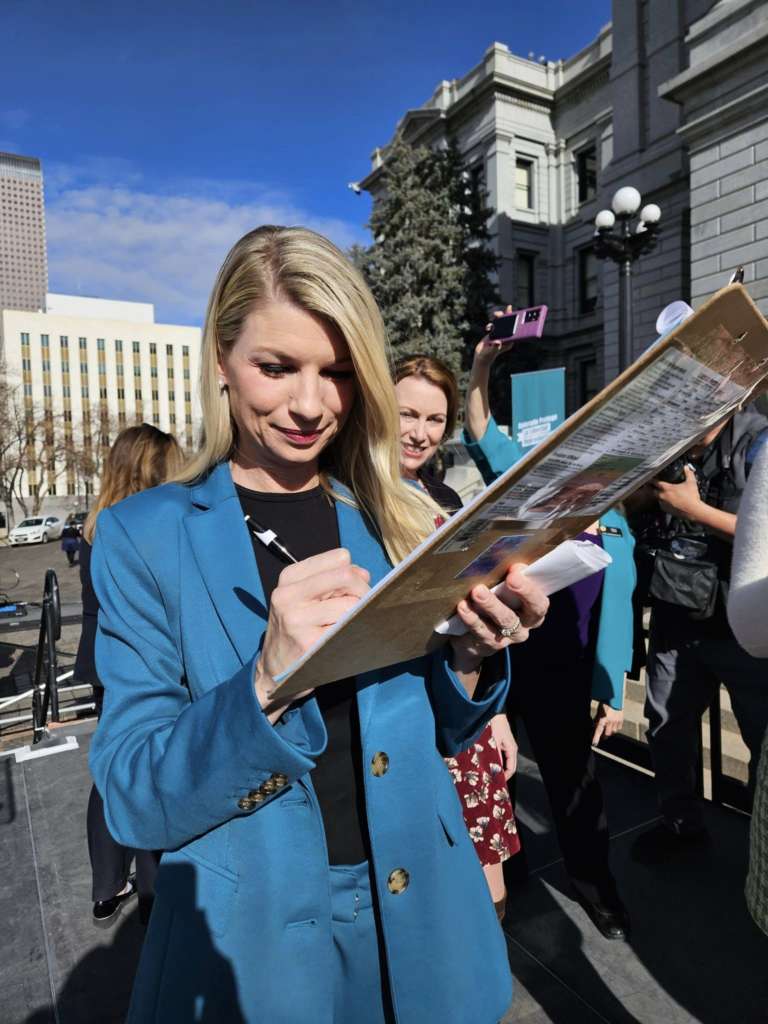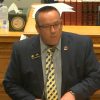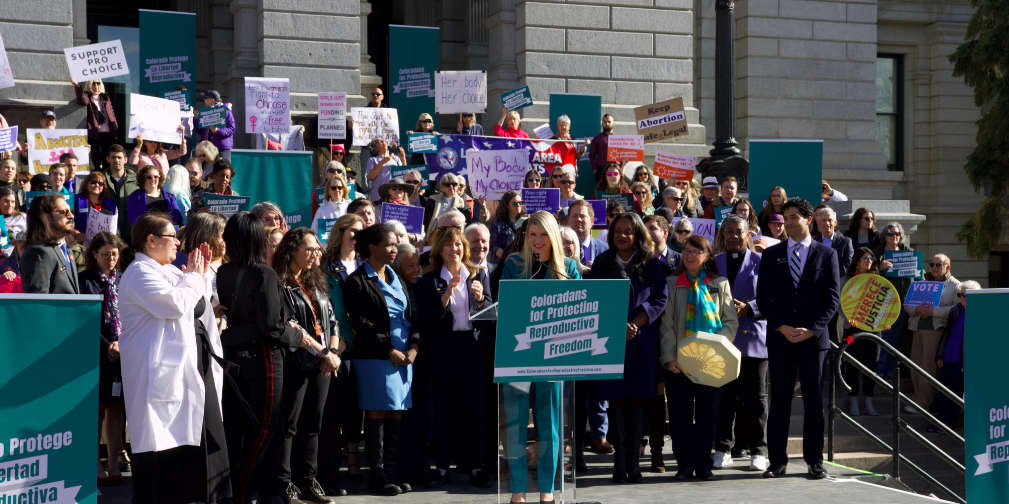Colorado abortion advocates, elected officials, and faith leaders rallied at the Capitol yesterday to celebrate the launch of the campaign for Prop 89, the “Right to Abortion” ballot initiative.
“Thank you for being here today, on Jan. 22, on what would have been the 51st anniversary of the Roe v Wade decision that the U.S. Supreme Court overturned in June of 2022, to mark the anniversary of what we all lost in 2022,” said Dusti Gurule, the president and CEO of the Colorado Organization for Latina Opportunity and Reproductive Rights (COLOR). “Here in Colorado, we’re here to officially launch our campaign to make sure we continue to strive forward, pushing back on the status quo, and demanding more for our communities and from our movement. On November 5th, with your help, we will enshrine in our state’s constitution the right to abortion free of government interference.”
Following the Dobbs decision, which overturned Roe, Colorado passed the Reproductive Health Equity Act, enshrining abortion under Colorado law. Prop 89 will amend the constitution to further protect abortion access in Colorado, following a trend of successful ballot initiatives across the nation.
“When the Dobbs decision overruled Roe v. Wade, it put, as Justice Alito acknowledged, the choice with the voters,” said Colorado Attorney General Phil Weiser. “Boy, have they ever spoken — in Kansas, in Kentucky, in Montana, in Ohio, and in many other states. This November, they’ll speak in Colorado.”
In the wake of Dobbs, Republican-controlled states have passed bans and restrictions on abortion, and at the federal level, legislators attempted inject anti-abortion clauses into important bills such as the National Defense Authorization Act or necessary spending bills.

“It can be incredibly frustrating being in Washington and seeing what the Republicans are bringing at the national level,” said U.S. Rep. Brittany Pettersen (D-CO). “I can tell you it’s not just about fighting against and protecting against the rogue Supreme Court. It’s about the Republican majority that has become so extreme. We can’t actually vote for a bill on the floor that is meaningful unless it has abortion bans and is going after transgender youth. They have become so radicalized that this is absolutely essential, that in every moment we do what we can to protect against what’s happening at the national level.”
Prop 89 would not only change the Colorado Constitution to recognize the right to abortion, it would also allow abortion to be covered under service health insurance plans for Colorado state and local government employees and enrollees in state and local governmental insurance programs.
“A 1984 amendment, which passed by less than one percentage point, forbids the state of Colorado from using any public funds to pay for abortion care unless the pregnancy is the result of rape or incest, or the pregnant person’s life is in immediate danger,” said Dr. Rebecca Cohen, a Denver-based OBGYN and abortion provider. “What this means is that anyone with state-funded insurance: teachers, firefighters, government employees, and people with Medicaid insurance coverage, cannot use their insurance to pay for abortion care. It is inequitable and cruel to say to someone, ‘You know, that the safest thing is for you to have an abortion.’ To say to someone, ‘You know that if your baby is born, he will live a short and painful life.’ To say to someone ‘You know, you cannot afford to care for a child, but unless you have several hundred dollars or for an abortion, or later in pregnancy, several thousand dollars, you’re going to have a baby.’”
Bianka Emerson, the president of Colorado Black Women for Political Action, discussed the impact of abortion access on issues like maternal mortality rates, which disproportionately affect Black women. “Reproductive rights is about health care access,” she said. “When we look at national and local statistics, Black women experience higher rates of maternal mortality than any other racial group. While we talk about reproductive rights, we must change the narrative to reproductive justice. Reproductive justice is a social construct, a movement created by Black women. It was created to address the racial injustices Black women face in reproductive health care. Reproductive justice is a holistic approach and answer to the disparities faced in health care systems by women of color, and at the core of reproductive justice is the belief that all women have the right to have children, the right to not have children, and the right to nurture the children we have in a safe and healthy environment.”
In addition to legislators and activists, faith leaders also addressed supporters during the rally. “I stand here today as a faith leader because my faith dictates equality and justice for women and all people,” said Valerie Jackson, a pastor at Park Hill United Methodist Church in Denver. “I stand here today because as a Black queer woman, I know all too well what it is like to be stripped of my power, autonomy, voice and agency by white, male and heteronormative supremacy. I stand here today because one never knows what life will bring to us. And 38 years ago, I was a woman in need of an abortion as a health care resource, and I cannot imagine not having my primary doctors and the hospital that I was comfortable with providing me with the service and support that I needed during that time.”
The national anti-abortion movement is driven in large part by conservative Christians and faith organizations. Rabbi Joseph Black, of Temple Emanuel in Denver, pushed back against a common argument from Christian anti-abortion activists.
“In the book of Deuteronomy, chapter 30, verse 19, we feel the following text that is often used by those who oppose the right to an abortion,” he said. “It reads as follows: ‘I call heaven and earth to witness against you this day. I have put before you life and death, blessing and curse. Choose life that you and your descendants may live.’ Now these words, ‘choose life,’ are quite powerful, but they also can be spun and defined in a variety of ways. They can be used to motivate us to live to our highest potential, choosing God’s loftiest ideals for our daily living and the choices we make, or they can be used as a weapon to narrowly define an agenda of intolerance. There are too many individuals and organizations who want to impose their own fundamentalist and draconian definition of when life begins, and for those who oppose abortion care.”
Black shared his own experience with abortion. “As a rabbi, I had worked with many couples in preparation for marriage, and I knew that since both of us were Ashkenazi, or Eastern European Jews, there was a slight possibility that we might carry one, or both of us might carry the gene for Tay-Sachs, a rare, incurable genetic disorder that results in a painful and gruesome death, usually within five years of birth for the infant,” he said. “Both my wife, Sue, and I discovered that we were carriers of Tay-Sachs. Thankfully, 33 years ago, in 1991, we were blessed by the birth of our healthy daughter, but our luck changed with our second pregnancy. To hear from our doctor that the embryo that we so desperately wanted to bring to term had a fateful disease was devastating. Thankfully, at that time, abortion was safe and legal. As difficult as it was to say goodbye to the hopes and dreams of a second baby, the thought of having to care for and eventually bury a suffering child was unpalatable. Termination of the pregnancy was the obvious choice, and my wife Sue received excellent care.”
Karen Middleton, President of Cobalt, ended the rally with a call to action. “This is fundamentally about equity,” she said. “Abortion should be a constitutional right. This proposed ballot measure has a zero fiscal note. This does not cost taxpayers money. It’s fair, it’s equitable, and it’s something we all need. Coloradans trust people and their doctors, not politicians, to make decisions about abortion. We empower people to live their own lives in a way that’s best for them. We can do this by continuing to be a beacon of hope, both now and in the future, by putting abortion rights in the Constitution. So today I’m asking you go to ColoradansForReproductiveFreedom.com. Sign up to donate. Sign up to volunteer. Sign up to spread the word to your friends and know that you can make a difference for everyone.”
The campaign will need 124,238 valid signatures to qualify for the November ballot, including 2% of the total registered electors in each of Colorado’s 35 state senate districts.




